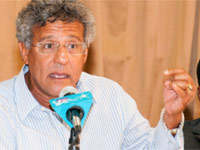 The late Dr. Cleveland Eneas used to say that if you want to hide something from a Bahamian put it in writing.
The late Dr. Cleveland Eneas used to say that if you want to hide something from a Bahamian put it in writing.
It has been an interesting couple of weeks since a completely innocuous midyear statement was made to the House about how the government proposes to conduct its immigration policy.
The debate has been framed to a large extent by the usual suspects who have a knee jerk reaction to any policy proposed by the PLP, but what they cannot say truthfully is that they did not know, that they did not understand and that it is not the right policy.
I said it this way in another place: what part about Bahamians first don’t you understand?
Politics makes strange bedfellows it is said. It is the art of the possible. The enemy of my enemy is my friend. So you would not then be surprised then that the man who made his political career after one term in office as an immigration minister, calling for a crackdown on immigration, is now saying that a crackdown on immigration would be injurious to the economy. He argues that the policy is misplaced because it deals with legal immigration and not illegal immigration. Wrong on both scores. In any event, it is the need for legal migration that is driving illegal migration so if we get legal migration under control, we also solve the illegal migration. He has in this found new religion and common cause with another perennial critic.
That critic revealed their own business to the country, misrepresented the decision, which is one which was lawfully given to the immigration board to dispense and to which decision there is a condition attached. That condition is one that has been attached to many past immigration board decisions and remains without lawful challenge, that you must find a Bahamian understudy as a condition of the renewal of the work permit. If the decision, is not reasonable then there is a recourse in law. But instead we have histrionics and then a set of business leaders who instead of reading the policy, they begin by lashing out based on a false picture framed by an institution which as I have just explained is not in a dispassionate position because they have an interest to protect. Indeed, if a minister of the government acted in his job the way that institution did, they would be screaming bloody murder and conflict of interest.
Nevertheless we proceed with reasonable policy proposals and the Bahamian people in the main have accepted them as a way forward. The way forward is Bahamians first.
Why should anyone be surprised? The PLP was elected campaigning on that slogan.
You know that we campaigned against the sale of BTC to Cable and Wireless and we said Bahamians first. We have been proven right. The telephone service is a hopeless failure and does not have the ability it appears to produce quality service despite the complaints about dropped calls, insensitive service provision, and the latest being the embarrassment of the country’s performance at the Carifta Games.
I am somewhat amused therefore at the public criticism of the government’s services for being slow like immigration and I admit it is slow, too slow, but the private sector gets clean away. We are trying to advance our country’s reach and influence into the United Arab Emirates, one of the richest and most forward thinking countries in the world. Yet when I landed there as minister a few days ago, the BTC phone did not work and upon checking there is no data or voice roaming agreement that would permit me to use the phone there. Similarly when I was in Morocco no data service.
What they appear to be good at is public relations and extracting profits from advertising and marketing, but not at providing a good basic service.
So in those circumstances, you ask yourself why would a general manager have to be brought in from the outside to run BTC when in fact there are Bahamians who could run the phone company. That is the starting point of immigration to protect jobs for Bahamians and it is only where Bahamians are not available that non Bahamians should be allowed. I ask again why this should not apply to the phone company.
I would like to share the five propositions on Immigration:
Firstly, Bahamians are for Bahamianization in a macro sense but in a micro sense they want their immigrant to be granted permission to work in The Bahamas.
Secondly, left to their devices some investors would and their Bahamian surrogates would plan Bahamians out of the economy of The Bahamas.
Thirdly, immigration policy has two competing objectives—protecting the work place for Bahamians and regulating the inflow of workers to The Bahamas where the skills are not available in The Bahamas.
Fourthly, immigration is a processing ministry and has the mission of processing applications for the workers and residents who wish to work and live in The Bahamas in a timely fashion.
Fifthly, immigration is an enforcement ministry and has the responsibility of arresting, detaining and expelling those non Bahamians who are not lawfully in The Bahamas, while at the same time being responsible for welcoming those people who are entering The Bahamas for a lawful purpose.
To carry out all of these propositions, the Department of Immigration has a staff of 231 people, who must administer these rules, laws and policies over 26 inhabited islands that stretch over four hundred miles of territory from north to south.
The question then is this: are Bahamians willing to pay for an immigration department?
It is interesting to me how some are always criticizing the government for not being progressive and forward thinking and analytical, yet in many respects the private sector services themselves suffer from the same cultural issues: the general slowness in our culture to get with the programme of modern life. It confounds me how a supposedly well-educated ruling class in the private sector can expect for things to go the same as before 2012 when the PLP came to power last year on some specific promises with regard to immigration.
The critics did not read what was said in the party’s Charter for Governance. They obviously did not pay attention when the budget debate took place last year and this minister said two things that I would wish to recall. That there would be no publicity with regard to immigration checks but that those checks would become a standard feature of Bahamian life and that Bahamians might have to come to accept as a price of their demand for these checks incursions on their civil liberties. I went further and said that the time might come when we would have to introduce an identity document and Bahamian would have to get used to traveling with it. I warned people who were undocumented like the children of foreign parents born here without a document status to get their applications in because one consequence of what was proposed was that they might be deported to a country that they never knew if they did not have their papers on them.
Recently, a Bahamian who had a Haitian citizenship of origin stopped me along the road, saying that I had changed and he was complaining that the Haitian community had too much pressure on it as a result of the policies that I was applying and that I needed to ease up. But this is not about me, this is the policy of the government and I wish people would stop personalizing it to me. The law is being enforced.
I keep telling people Fred Mitchell cannot solve the immigration problem of The Bahamas.
But I will say this: public servants like to say ministers come and go and before you know it, the minister can be gone but as long as I am here the policy of scrutiny, immigration checks and enforcement and strict adherence to Bahamians first in immigration work permit policy will be observed.
The second observation of the private sector is the need to pay attention to how the PLP is governed and how we got to be back in the government, how policies are designed and who influences policy making. The backbone of the PLP is the National General Council. These are thousands of men and women across the country, scores of whom meet and met every week when we were in Opposition. They kept us going. They battled for us in the public forums. They lent us their children and their grandchildren in the campaign. They took to the streets when no one else had our backs. In this regard, I want the private sector in Grand Bahama to get to know Betty Sweeting. She single handedly organized the stalwart councilors in Freeport to revolt against the practices of employers in Freeport who were not hiring Bahamians to do labouring jobs.
The PLP owes these councilors big time. We are guided philosophically by their dreams and goals for their children, grandchildren and great grandchildren. They remember when the training policies implemented by Lynden Pindling resulted in a whole generation of people running the companies in Freeport. They cannot understand how today when their children and grandchildren have a better education than they did, these same children and grandchildren and great grandchildren cannot get an opportunity for work in Freeport. And every time you speak to the private sector in Freeport, They are filled with excuses about why it can’t be done and Bahamians cannot do it.
So I would say to the private sectors in both Freeport and in Nassau, in fact throughout The Bahamas, it would be wise to know what the people on our National General Council think. This minister intends to live up to our promises to them to ensure that their grandchildren and great grandchildren get a stake in this economy. So if you want things to change from the existing policies in immigration, you had better speak to them.
Let me assure you again that notwithstanding all the propaganda to the contrary, the policies on immigration are designed to help grow this economy and to give Bahamians the greatest stake in this economy. That is all.
What is important to know is that immigration is quite a complex issue and in a speech like this I cannot cover all the nuances and aspects of it. I can only cover a few issues and respond to recent untrue information. No doubt there will be more statements to come and more dialogue.
At the end of the day though immigration decisions are subjective, in the sense that they turn on their own facts, each case that is. This is The Bahamas where the living is easy and any problem is resolvable by a phone call or an appeal to rationality and reasonableness, not by histrionics and propaganda. So if you have a particular problem, let us know and we will try to resolve it.
Thank you. Bless you all.
– Fred Mitchell
Minister of Foreign Affairs and Immigration


